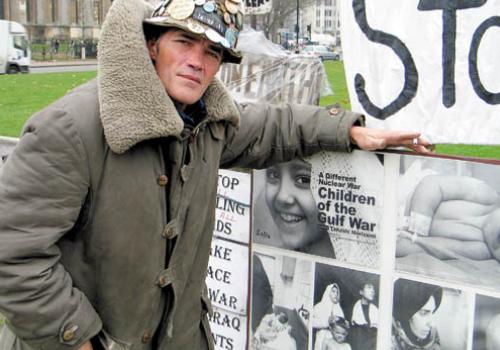Death of veteran peace campaigner Brian Haw - scourge of Parliament loses battle with lung cancer

Published: 24 June 2011
by JOSH LOEB
FOR 10 years Brian Haw, who died on Saturday aged 62, was one of Westminster’s most prominent residents. In June 2001 he made his home amid the noise and traffic fumes of central London, on an island of grass facing the seat of political power.
It was impossible for anyone passing Parliament Square to ignore his “peace camp” base, from where, day in and day out, the committed Christian would loudly rage against the government’s policy in the Middle East.
Politicians and Westminster councillors certainly found it hard to turn a blind eye to his proclamations, and he fought off innumerable court challenges waged by Mayor Boris Johnson and Westminster City Council in a bid to prise him from his pitch.
Mr Haw was last due in court as recently as two weeks ago, and a hearing set to take place later this year could lead to his camp being dismantled.
Friends and fellow campaigners, some of whom were last week at his bedside in the clinic in Germany where he died after a long battle with lung cancer, now take it in turns to man his tents.
Born in Essex in 1949, Mr Haw’s religious faith imbued him with a powerful sense of social justice, which was cemented via visits to the killing fields of Cambodia and Northern Ireland at the height of the Troubles.
Wartime atrocities seemed to preoccupy him – his father had been among the first troops to enter the Bergen-Belsen concentration camp after its liberation, and he felt moved by the films of John Pilger.
A father of seven, Mr Haw worked as a carpenter and taught troubled youngsters in Worcestershire before starting his vigil, initially in protest at Western sanctions on Iraq but subsequently in opposition to the wars launched by George Bush and Tony Blair.
Former CND general secretary Bruce Kent said he regarded him as “a bit of a prophet – I think he always thought people like me weren’t 100 per cent committed. To him 100 per cent commitment meant 24-hour activity.”
Milan Rai, the peace campaigner arrested in 2005 for taking part in an illegal demonstration that involved standing next to the Cenotaph and reading aloud the names of people killed during the Iraq War, met Mr Haw numerous times.
He said: “Brian was a symbol and a channel for the anger of I think most people in this country.
“It was his endurance and compassion for the people of Iraq and his anger about what was being done in our names which made him a personification of what a lot of people felt about Iraq and about our government.”
While the council branded Mr Haw’s camp an “obstruction” and police officers paid him regular visits, others felt the vigil was a credit to British democracy.
Labour MP Jeremy Corbyn said Mr Haw had helped remind MPs of “the consequences of their decisions”, and Green Party London Assembly Member Jenny Jones called him a “true British eccentric”.
A statement posted on the website brianhaw.tv by Mr Haw’s family and supporters stated: “He left us in his sleep and in no pain, after a long, hard fight. With your help we have been able to share months more than we should have had with him, and for that we are eternally grateful.”
Funeral arrangements are yet to be announced.



